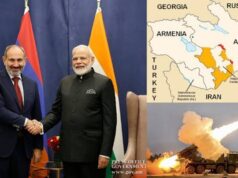Accute inflation, deep Economic Crisis in Pakistan and Pakistan Occupied territories

Pakistan is in the grip of the worst economic crisis in its history. It is likely to default soon, despite negotiations with the IMF and the state’s adherence to many of their conditions.
People of Pakistan need to align their struggle against the IMF and the anti-poor policies of the state with the struggle for a working-class revolution. The worst sufferers are the nationals of the territories which have been forcibly occupied by Pakistan that is Baluchistan and Indian territory of POK.
Pakistan continues to grapple with economic challenges due to a shortage of foreign exchange reserves, citizens find it tough to buy everyday essentials like flour, oil and gas.
Pakistan’s annual inflation rate hit 35 per cent in March, fuelled by a depreciating currency, a rollback in subsidies and the imposition of higher tariffs to secure a bailout package of USD 1.1 billion from the International Monetary Fund. Food inflation has soared to 47 per cent, according to The Express Tribune.
Daily necessities such as gas, electricity, petrol and flour are getting more and more out of reach or prohibitively expensive for the average person to acquire in Pakistan.
Emphasising the need to build solidarity networks between workers and the progressive movements, the protesters held rallies in Islamabad against rising inflation as Pakistan is witnessing its worst economic crisis, Dawn reported.
The Awami Workers Party (AWP), Progressive Students Federation (PrSF), and Women Democratic Front (WDF) planned the protest to honour May 1st, also known as International Labour Day.
To commemorate the day, similar gatherings and conferences were also held in Rawalpindi and Gilgit-Baltistan.
According to Dawn, the organisers of the jalsa also shared their political platform against Pakistan’s rising inflation, which included a liveable minimum wage that is raised in accordance with the cost of necessities, redistribution of land, free health care and education, rejection of the IMF programme, implementation of a budget that is friendly to the general public, and taxing the wealthy and ending their tax breaks.
Whereas WDF leader Tooba Syed underlined how women are still underpaid and experience gender bias.
“The origins of Labour Day stem from working-class movements’ fight for an 8-hour working day. Even now, we still witness women, continuing to work more than eight hours a day, in paid and unpaid labour,” Tooba Syed said, according to Dawn.




